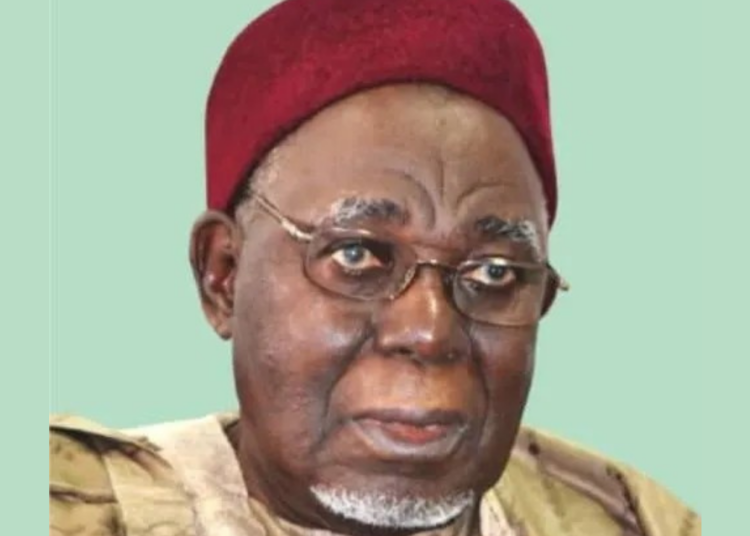I had been hearing about Alhaji Adamu Fika, Wazirin Fika since at least the early 1980s, when he was a Federal Permanent Secretary in Lagos, partly because many Fika Emirate students were my friends and his daughter, Hajiya Larai, was two years behind me in school.
I did not get to see him with my own eyes until 1991. I was a Principal Correspondent at Citizen magazine in Kaduna and there was some civil service reform issue during the Babangida regime. Our Executive Editor, Malam Adamu Adamu, phoned Waziri and asked for his views, and he said he should come to his house. Malam Adamu hurriedly dragged him from my desk and we sped off to Waziri’s house.
Waziri received us in his library, which had books and papers nearly reaching up to the ceiling. We were with him for 90 minutes. He spoke authoritatively on every civil service matter. Every now and then, Waziri stood up and plucked one circular or budget estimate from the bookshelves in order to prove his point.
When we returned to the office, Malam Adamu said I should write a story from what Waziri said. I was taken aback; with no notes? I could see, from how meticulously exact Waziri was, that it would be dangerous if I misquoted him, so the next day, without telling the editor, I appeared unannounced at Waziri’s house, this time with prepared questions. He received me warmly but refused to allow me to record the conversation, saying it was “just discussion.”
Waziri told me many stories that day, including his disagreement with military President Ibrahim Babangida in 1988 that led to his forced retirement from service.
In 1988, IBB undertook some “reforms” of the civil service. As part of them, he wanted ministers to take over the function of Accounting Officers from permanent secretaries, whom he had renamed Directors General. As Head of the Federal Civil Service, Waziri stoutly opposed the reforms. IBB said, “You mean only civil servants are patriotic enough to protect funds?” And Waziri replied, “It is not a matter of patriotism but of training. Of course IBB went ahead with his reforms, which were abandoned some years later. Waziri quit the service due to that quarrel.
Since then, until in recent years when his health began to fail due to old age, Waziri called me innumerable times on the phone whenever he read my columns, usually to shed further light on an issue, or sometimes to dispute what I wrote. For example, in one article I wrote to mark the anniversary of Sardauna of Sokoto’s passing, I recounted a story that the late Wazirin Katsina Alhaji Isa Kaita once told on television. It was about how, in 1956 or thereabouts, Sardauna intervened forcefully with the colonial Governor of Northern Nigeria, Sherwood-Smith, in order to get the first Northerners appointed as Permanent Secretaries.
Waziri disputed the story. He said one of the rules that the colonial officers got Sardauna and other regional and federal politicians to agree to was that there would be no interference with civil service rules. It was very difficult for me to iron out this matter. I personally heard Isa Kaita telling this story in a TV documentary about Sardauna. He was Northern Minister of Education and one of Sardauna’s closest associates, but Waziri said it couldn’t have happened like that. Who am I to judge between these grand old statesmen?
Fika, I came to the conclusion, perhaps erroneously, that he was very conservative and wanted everything to be done the old way. He was a stickler for propriety, procedure, records, rules and regulations such as I did not see in any other old civil servant in my three decades in journalism. Perhaps that made Waziri difficult to work with in some instances. During the Abacha era, Waziri became the first Chairman of Federal Character Commission. Our late colleague Dr. Sabo Bako was the Secretary. They soon fell out, not surprisingly, because Dr Sabo’s ABU Zaria lecturer’s habits were out of sync with Waziri’s grand old civil service habits. Abacha settled the quarrel when he reportedly said, “Tell that Doctor to return to ABU.”
With his passing, we have lost one of the most upright men, an encyclopaedia on the public service, one with the best knowledge of the history and workings of the civil service, and a community leader without parallel who was always available to offer his rich store of wisdom on community issues and problems. At 90, he lived a long and rich life. May Allah grant Wazirin Fika eternal rest in Aljannat and give his family, Fika Emirate, Yobe State and all his numerous students and mentees the fortitude to bear this irreparable loss.
Jega, is the editor-in- chief of 21st Century Chronicle.











